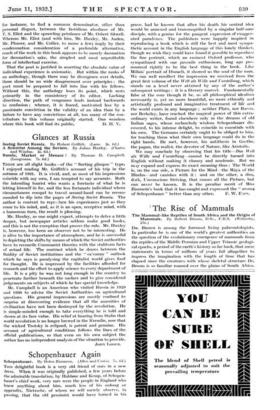Glances at Russia
Russia; Market or Menace ? By Thomas D. Campbell. (Longmans. 7s. 6d.) THESE are all slight books—of the "fleeting glimpse" type. I enjoyed reading Mr. Griffith's account of his trip in the autumn of 1931. It is vivid, and, as most of his impressions coincide with my own, I am tempted to say accurate. Both the intending tourist who wants a foretaste of what he is letting himself in for, and the less fortunate individual whom circumstances compel to travel second-hand can be recom- mended to dip into the pages of Seeing Soviet Russia. The author is content to reproluce his experiences just as they come to his Mind, and, as it is an open, receptive mind, with a humorous turn, the result is pleasing.
Mr. Huxley, as one might expect, attempts to delve a little deeper, but newspaper articles seldom make good books, and this is not the exception that proves the rule. Mr. Huxley is, however, too keen an observer not to be interesting. He is alive to the importance of atmosphere, and he is successful in depicting the shifts by means of which the Soviet authorities have to reconcile Communist theories with the stubborn facts of actual life. The contrast which he draws between the fluidity of Soviet institutions and the " ca.eanny " outlook which he says is paralysing the capitalist world gives food for thought. He is impressed by the facilities afforded for research and the effort to apply science to every department of life. It is a pity lie was not long enough in the country to penetrate further beneath the surface and to give considered judgements on subjects of which lie has special knowledge. Mr. Campbell is an American who visited Russia in 1929 and 1930 to advise the Soviet Authorities on agricultural questions. His general impressions are mostly confined to surprise at discovering evidence that all the amenities of civilization have not been destroyed by the revolution. He is simple-minded enough to take everything he is told and shown at its face value. His relief at hearing from Stalin that world revolution is no longer brewed in the Kremlin, now that the wicked Trotsky is eclipsed, is patent and genuine. His account of agricultural conditions follows the lines of the official publications, so that even on his own subject the author has no independent analysisof the situation to provide.
JOHN Loma.


































 Previous page
Previous page